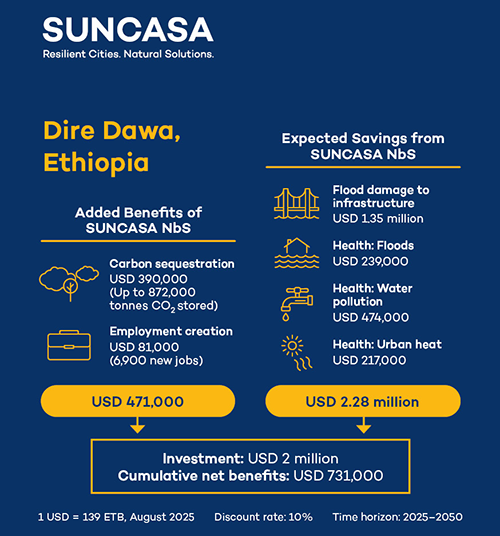NbS for Flood Management in Dire Dawa, Ethiopia
In Dire Dawa, Ethiopia, flash floods, soil erosion, and water scarcity pose critical climate threats.
In Dire Dawa, Ethiopia, flash floods, soil erosion, and water scarcity pose critical climate threats.

In Dire Dawa, Ethiopia, flash floods, soil erosion, and water scarcity pose critical climate threats to the population, particularly those living in flood-prone areas in urban and rural kebeles (villages). Community livelihoods and local economy are at risk due to droughts and escalating heat, and declining groundwater levels threaten the city’s water security.
The Scaling Urban Nature-based Solution for Climate Adaptation in Sub-Saharan Africa (SUNCASA) project is working with local communities and organizations to restore the Dechatu River catchment through nature-based solutions (NbS) implemented in partnership with local organizations.
The NbS include afforestation, buffer zone establishment, and agroforestry for runoff management and livelihoods, as well as urban tree planting to reduce flooding and heat impacts. These interventions aim to restore degraded land, enhance groundwater recharge, mitigate soil erosion, and strengthen climate resilience across the Dechatu River catchment.
The SAVi assessment of the SUNCASA interventions in Dire Dawa shows that investing in NbS brings strong social, environmental, and economic returns.
By 2050, the largest impacts resulting from SUNCASA investments will come from avoided flood damage to infrastructure (USD 1.35 million), savings in climate-related health expenses (USD 930,000) from floods, water pollution, and heat, and carbon sequestration valued at USD 390,000.
Over a 25-year period, it is expected that every USD 1 invested in SUNCASA NbS will deliver USD 1.36 in socio-economic benefits. Additionally, these interventions will create nearly 7,000 jobs and strengthen resilience for over 220,000 people in one of Ethiopia’s most climate vulnerable regions.

Local partners in Dire Dawa include the Dire Dawa Administration, the Hararghe Catholic Secretariat, and Haramaya University.
Photograph: Cesar H. Arrais
By 2050, more than 65% of Africa’s 2.5 billion population will live in cities. However, incipient climate governance systems, rapid urbanization, and deforestation have degraded landscapes and ecosystems, affecting urban communities’ capacity to adapt to climate change. The Intergovernmental Panel on Climate Change predicts temperatures in Africa will rise faster than the global land average, and many cities will face water scarcity, droughts, increased urban heat, and greater flood risk from intensifying storm events. As environmental threats multiply, underserved and marginalized communities are likely to experience increasingly adverse impacts.
Jointly managed by the International Institute for Sustainable Development (IISD) and the World Resources Institute (WRI), with USD 22 million in funding from Global Affairs Canada through the Partnering for the Climate Program, SUNCASA will benefit 2.2 million people by increasing their resilience to climate risk, directly train and support over 22,000 individuals involved in implementation, and improve water security for millions more.
The project will work with local partners in Dire Dawa (Ethiopia), Kigali (Rwanda), and Johannesburg (South Africa) to improve vulnerable urban communities’ capacity to adapt to climate change. By adopting and implementing gender-responsive NBS to restore watersheds, riparian corridors, and urban green spaces, the SUNCASA project directly responds to risks like climate change-induced flooding, landslides, extreme heat, and biodiversity loss. SUNCASA also aims to address gender gaps in climate adaptation: at least 50% of the project’s beneficiaries will be women, representing a shift in existing social norms.
The NBI Global Resource Centre aims to bring together key partners to establish a business case for Nature-Based Infrastructure (NBI).
Get in touch to learn more, collaborate, or for media enquiries and speaking engagements.